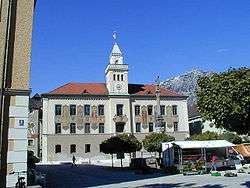Bad Reichenhall
| Bad Reichenhall | ||
|---|---|---|
 Former town hall | ||
| ||
 Bad Reichenhall Location of Bad Reichenhall within Berchtesgadener Land district  | ||
| Coordinates: 47°43′29″N 12°52′37″E / 47.72472°N 12.87694°ECoordinates: 47°43′29″N 12°52′37″E / 47.72472°N 12.87694°E | ||
| Country | Germany | |
| State | Bavaria | |
| Admin. region | Upper Bavaria | |
| District | Berchtesgadener Land | |
| Government | ||
| • Lord Mayor | Herbert Lackner (CSU) | |
| Area | ||
| • Total | 39.44 km2 (15.23 sq mi) | |
| Elevation | 473 m (1,552 ft) | |
| Population (2017-12-31)[1] | ||
| • Total | 17,951 | |
| • Density | 460/km2 (1,200/sq mi) | |
| Time zone | CET/CEST (UTC+1/+2) | |
| Postal codes | 83435 | |
| Dialling codes | 08651 | |
| Vehicle registration | BGL (until 1979: REI) | |
| Website | www.stadt-bad-reichenhall.de | |
Bad Reichenhall is a spa town, and administrative center of the Berchtesgadener Land district in Upper Bavaria, Germany. It is located near Salzburg in a basin encircled by the Chiemgau Alps (including Mount Staufen (1,771 m) and Mount Zwiesel (1,781 m)). Together with other alpine towns Bad Reichenhall engages in the Alpine Town of the Year Association for the implementation of the Alpine Convention to achieve sustainable development in the alpine arc. Bad Reichenhall was awarded Alpine Town of the Year 2001.
Bad Reichenhall is a traditional center of salt production, obtained by evaporating water saturated with salt from brine ponds.
History
- The earliest known inhabitants of this area are the tribes of the Glockenbecher-Culture (a Bronze Age Culture, from about 2000 B.C.)
- In the age of the La Tene culture (about 450 B.C.) organised salt production commenced utilising the local brine pools. In the same period a Celtic place of worship is placed at the "Langacker".
- From 15 B.C to 480 A.D, the city is part of a Roman province, Noricum
- 1136 A.D bought the founding of a monastery St. Zeno.
- In 1617-1619, a wooden pipeline for brine exportation to Traunstein was built, with a length of 31 km, and more than 200 m in altitude difference.
- In 1834, two thirds of the city's buildings were destroyed by a major fire.
- The early 19th century saw the beginning of tourism, with Reichenhall becoming a famous health resort.
- From 1890, Reichenhall is now called "Bad Reichenhall".
- On 25 April 1945, the area was bombed by allied forces, 200 people were killed. The town centre with many hospitals and the train station was nearly totally destroyed, the barracks didn't suffer any damage. After World War II the area was under American military governance (1945–1948).
- On 8 May 1945, a dozen French POWs from the SS Division Charlemagne were executed without trial on the orders of General Leclerc.
- On 1 November 1999, 16-year-old Martin Peyerl shot at people in the streets from his bedroom window, killing three and wounding several others, among them actor Günter Lamprecht. He finally committed suicide after fatally shooting his sister and the family cat.
Ice rink disaster
Fifteen people, twelve of them children, died in the collapse of the Bad Reichenhall Ice Rink on 2 January 2006. Thirty-four people were injured in the accident.[2]
Notable people from Bad Reichenhall
- Anni Friesinger-Postma (born 1977), German speed skater (born in Bad Reichenhall, lived in Inzell ~10 km away and now lives in Salzburg)
- Lore Frisch, well known German actress in the 1940s and 1950s. Moved from Traunstein to Bad Reichenhall in the mid-1930s and got her start in acting in Bad Reichenhall before becoming famous in Munich and Berlin.
- Barbara Gruber, ski mountaineer
- Regina Häusl, alpine skier (born in Bad Reichenhall, started for the Ski-Klub Bad Reichenhall, lives in Schneizlreuth since her birth)
- Andreas Hinterstoisser (1914–1936), German mountaineer
- Andreas Hofer (composer), composer (1629–1684)
- Michael Neumayer, (* 1979), ski jumper
- Georg Nickaes, (* 1971), ski mountaineer
- Günther Rall (1918–2009), World War II Luftwaffe ace, postwar Luftwaffe general
- Karl Ullrich (1910–1996), SS Oberführer
- Johannes Frießner (1892–1971), World War II German Army general
- Walter Grabmann (1905–1992), German World War II Luftwaffe General
- Hans Söllner, (* 1955), singer-songwriter
- Peter Schreyer, (* 1953), car designer
- Franz Oberwinkler, (1939–2018), mycologist, expert on Heterobasidiomycetes
- Walter F. Tichy, (* 1952), computer scientist, initial developer of the RCS revision control system
Gallery
 Alte Saline (old salt refinery)
Alte Saline (old salt refinery)
References
- ↑ "Fortschreibung des Bevölkerungsstandes". Bayerisches Landesamt für Statistik und Datenverarbeitung (in German). September 2018.
- ↑
External links
| Wikivoyage has a travel guide for Bad Reichenhall. |
| Wikimedia Commons has media related to Bad Reichenhall. |
